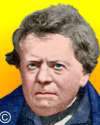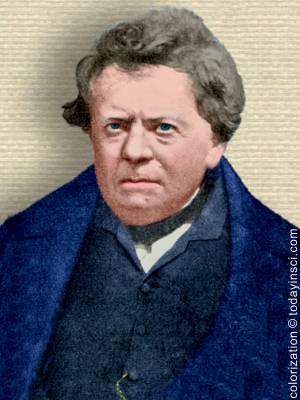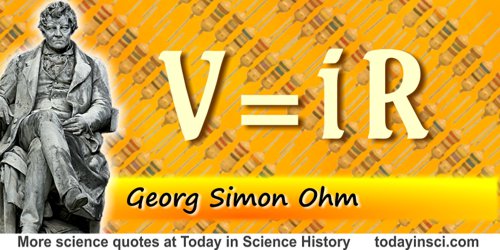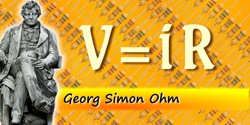 (source)
(source)
|
Georg Simon Ohm
(16 Mar 1789 - 6 Jul 1854)
German physicist who is known for his statement of his famous Ohm’s Law: V=iR. This relates current flowing through the resistance of a conductor and the potential difference (voltage) across it, at constant temperature.
|
Science Quotes by Georg Simon Ohm (1 quote)
The force of the current in a galvanic circuit is directly as the sum of all the tensions, and inversely as the entire reduced length of the circuit.
[S = A / L; now written as Ohms Law: V = i R.]
[S = A / L; now written as Ohms Law: V = i R.]
— Georg Simon Ohm
The first expression of Ohm's Law, From Die Galvanische Kette mathematische bearbeitet (1827), 36. As translated by William Francis in The Galvanic Circuit Investigated Mathematically (1891), 50. This is now known as Ohm’s Law: V = i R, or i = V / R. From the original German, “Die Grösse des Stromes in einer galvanischen Kette ist der Summe aller Spannungen direkt, und der ganzen reduzirten Länge der Kette umgekehrt proportional.” Ohm uses S for the Strength of the current, A for total potential difference (or voltage) and L for “reduced length” which is now interpreted directly as resistance of the circuit. The translation footnotes: “‘Reduced length’ is the length of a copper wire of a given thickness, the resistance of which is equivalent to the sum of the resistance in a circuit, Ohm calls a reduced length." — Charles Wheatstone in his Bakerian Lecture (15 Jun 1843).
Quotes by others about Georg Simon Ohm (2)
Ohm found that the results could be summed up in such a simple law that he who runs may read it, and a schoolboy now can predict what a Faraday then could only guess at roughly. By Ohm's discovery a large part of the domain of electricity became annexed by Coulomb's discovery of the law of inverse squares, and completely annexed by Green's investigations. Poisson attacked the difficult problem of induced magnetisation, and his results, though differently expressed, are still the theory, as a most important first approximation. Ampere brought a multitude of phenomena into theory by his investigations of the mechanical forces between conductors supporting currents and magnets. Then there were the remarkable researches of Faraday, the prince of experimentalists, on electrostatics and electrodynamics and the induction of currents. These were rather long in being brought from the crude experimental state to a compact system, expressing the real essence. Unfortunately, in my opinion, Faraday was not a mathematician. It can scarely be doubted that had he been one, he would have anticipated much later work. He would, for instance, knowing Ampere's theory, by his own results have readily been led to Neumann’s theory, and the connected work of Helmholtz and Thomson. But it is perhaps too much to expect a man to be both the prince of experimentalists and a competent mathematician.
From article 'Electro-magnetic Theory II', in The Electrician (16 Jan 1891), 26, No. 661, 331.
Ohm (a distinguished mathematician, be it noted) brought into order a host of puzzling facts connecting electromotive force and electric current in conductors, which all previous electricians had only succeeded in loosely binding together qualitatively under some rather vague statements. Even as late as 20 years ago, “quantity” and “tension” were much used by men who did not fully appreciate Ohm's law. (Is it not rather remarkable that some of Germany's best men of genius should have been, perhaps, unfairly treated? Ohm; Mayer; Reis; even von Helmholtz has mentioned the difficulty he had in getting recognised. But perhaps it is the same all the world over.)
See also:
- 16 Mar - short biography, births, deaths and events on date of Ohm's birth.
- Georg Simon Ohm - Short biography from John Munro, Pioneers of Electricity; Or, Short Lives of the Great Electricians (1890).
- Georg Simon Ohm - In-depth biography from Rollo Appleyard, Pioneers of Electrical Communication (1930).



 In science it often happens that scientists say, 'You know that's a really good argument; my position is mistaken,' and then they would actually change their minds and you never hear that old view from them again. They really do it. It doesn't happen as often as it should, because scientists are human and change is sometimes painful. But it happens every day. I cannot recall the last time something like that happened in politics or religion.
(1987) --
In science it often happens that scientists say, 'You know that's a really good argument; my position is mistaken,' and then they would actually change their minds and you never hear that old view from them again. They really do it. It doesn't happen as often as it should, because scientists are human and change is sometimes painful. But it happens every day. I cannot recall the last time something like that happened in politics or religion.
(1987) -- 


